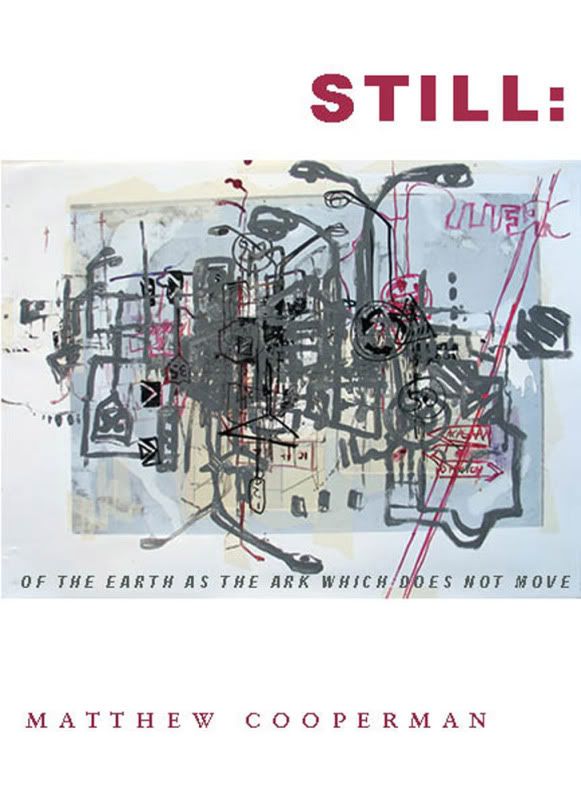The “Whitman orb is humming” (109) writes Matthew Cooperman in his most recent collection Still: Of The Earth As The Ark Which Does Not Move (Counterpath, 2011). Indeed, Whitman's inclusive view of the United States (and the world for that matter) rears its head once more, but updated by Cooperman for the twenty-first century in an expansive but distopian catalog that harnesses the “wall of / information streaming across” (77) our contemporary landscape.
In the preface to the 1855 edition of Leaves of Grass, the gray-bearded bard claimed that “Americans of all nations at any time upon the earth have probably the fullest poetical nature,” and that the “United States themselves are essentially the greatest poem.” But far from imagining a nation and its people as poesy incarnate, Cooperman envisions America and its ilk as “a civilization that destroys things.” Yes, at some point during the past one hundred and fifty-six years, our country became not a concept for poets to praise as a model of “the fittest for its days,” but, instead, a problem that begged the question: “who will survive the American Ark?” The answer?; “few animals, very few negros, and no crackers at all” (115). In Still, America the beautiful transforms into America the desolate, a nation undone by its own hand.
Of course, in Cooperman's book, America isn't necessarily desolate, strictly speaking, just devoid of the “compassion” Whitman experienced “at the sight of numberless brothers answering our equal friendship and calling no man master.” Occupying the void, instead, are new catalogs filled with new masters:
Industry Leaders: Carson, Sno-shovels, Michelin Tires, Carhart Jackets, Amish Logos” (1)…Product Launch: Doubting Thomas: Jesus' Hole; 3M Camo Gloves: Serving Those Who Serve; Nikon Infared Binocs: Seeing the Craven Enemy Crouching in the Dark; Nihilism: A Perfume; ACLU: Bringing Freedom to Court” (18)…Pain Reliever: Tylenol, Advil, NyQuil, BENGAY, GAME BOY, PlayStation, PlayBoy, OAKLEY (51)…Mascot: wild indian, Wild Turkey, Nestlé, DUPONT, Sponge Bob Sponges (67)
Where Whitman understood that “the genius of the United States is not best or most in its executives or legislature...but always most in the common people,” the speaker of these poems believes that the “common people” of today's United States may no longer have a voice. In fact, the speaker himself is “not here at all” (40); and if he momentarily appears, he only does so allegorically in the form of “impatience, greed, jealousy, [and] ego” (89). It would seem that, today, there are only executives and legislatures because those are the identities that what we, as a nation, yearn to inhabit. We have become, literally, the information, technology, warmongering, and commercialism that envelopes us; so when poem “Still: Here,” states, “in the end, I'm still here,” it speaks the truth: we are still here, but our “countenance” (112) looks remarkably similar to the inventory of images Cooperman's catalogs provide for us.
In the face of such pessimism, one might rightly ask: what, then, is the point of caring, trying, or resisting? Toward the conclusion of Still, we discover our reason for persevering: “the ark of the moral universe is long, but it bends towards justice” (114). Our immediate circumstances may appear bleak, but belief in a just outcome ought to instill in us a patient, but proactive resistance. Or, as Cooperman writes: “I must create a system or be enslaved by another man's” (114).
In developing one's own system, in other words, a “form about / a person or / the forms about / a country,” one “awakens / beyond himself” and sees a “gathering in things / that belong / to peoples sad / and a time” (106). Stated differently, we, the sad people of our times, must awaken from the deadening slumber of a technologically-based, consumer culture and collectively realize that what surrounds us at this moment is of our own construction. Just as we have created these material conditions, we have the ability to alter them. For Cooperman, the forms of catalog and counted verse in Still are his systems, and their contents are the things he's gathered; through them, he begins the task of reclaiming his voice, himself, his country, and his world.


No comments:
Post a Comment